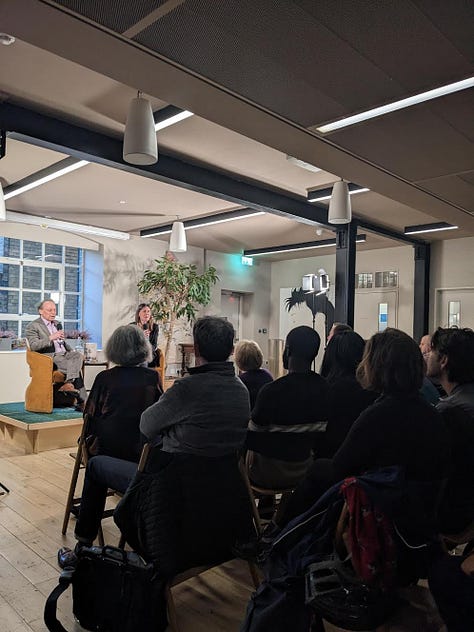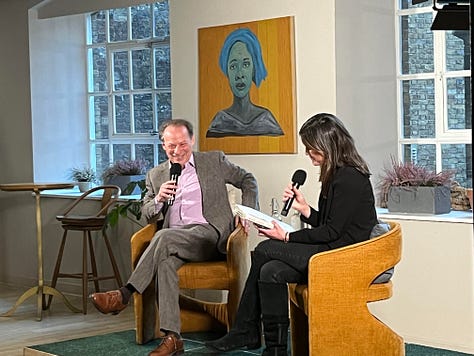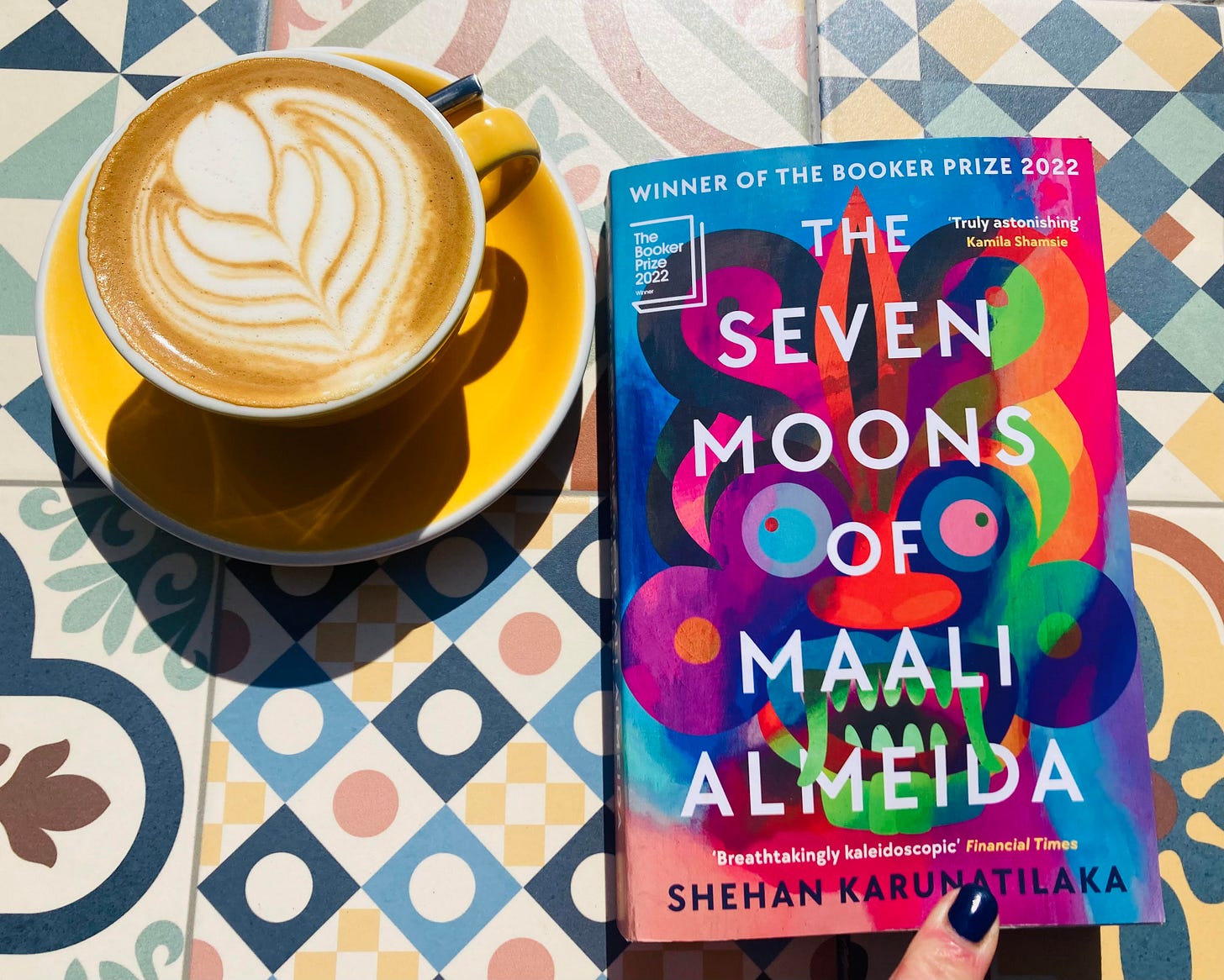On Achievement versus accomplishment, Creativity discipline & the power of publishers
With Writer Adam Gopnik & 2O22 Booker Winner Shehan Kerunatilaka.
Conversationists: Writer Adam Gopnik & 2O22 Booker Winner Shehan Kerunatilaka.
***
Mastery: Achievement v Accomplishment
A few weeks ago I sat down to an in conversation event with New Yorker Writer Adam Gopnik. Despite an illustrious career in journalism, for which he has been richly rewarded, he is now, somewhat to his amusement, most widely recognised for his recent cameo in the film ‘Tár’ alongside Cate Blanchett.
We were brought together for a How To Academy event at The Conduit Club, Covent Garden, a place that very much stands out from other members clubs, which I am not generally a fan of to be honest. They always feel fusty, like they belong to another era. The Conduit though is on a genuine mission to discuss and galvanise societal and environmental change and has a great vibe with green, leafy, woody interiors focused on sustainability. There’s also a lively rooftop bar. (More info and discounts below!)



A live audience came to hear us discuss Gopnik’s new book The Real Work, The Mystery of Mastery in which he takes up all manner of pursuits from life drawing to boxing, dancing to baking, in order to explore what enables a person to master a craft and discover what he calls “the nature of accomplishment.”
All taken on in homage to this beautiful verse from ‘The Summer Day’ by Mary Oliver:
Tell me, what else should I have done? Doesn't everything die at last, and too soon? Tell me, what is it you plan to do with your one wild and precious life?
Gopnik describes how everything you learn is “a composite of small steps” …’“a slow carpentering of fragments into the illusion of a harmonious whole.”
I ask him what he meant by ‘the Real Work’ and why he became fascinated by it:
‘The Real Work is a phrase that magicians use. But I recognised it as a universally applicable concept because we all know whose got the ‘real work’ in any field, whose got the best balance between virtuosity and soul. It’s how we judge musicians, writers, presenters …
Within that idea was this rich idea of mastery. We tend, in our civilisation, broadly across the globe, to emphasise achievement at the expense of accomplishment. We drive our kids in particular to get into the next grade, past the next test. We give them a set of hurdles to leap over and they leap over them abundantly or obediently. But I always feel they get much less from the experiences than they do from the private obsessive forms of accomplishment they pursue. I felt my 13 year old son Luke was getting more from learning a classic magic routine than he was out of trigonometry in eighth grade just as I did at the same age. The key event in my life was when I was 12. It was not from school. It was when I brought a 40 dollar folk guitar and a big book of Beatles songs and learned the C, F, G and A minor Chords. To my amazement, I started making music. Without exaggeration, everything I have done since in life has been on the foundation of those four chords, that activity of looking at something that seemed utterly impenetrable and making sense of it”
“Those moments are exhilarating. They’re what I call a cognitive opiate.”
“The experience of learning, especially those physical skills, which are inseparable from higher mental skills is that in every case you start off with all these counter intuitive stumbling small steps. Like when learning to dance, stumbling over feet as you try to hold your partner in a straight line. And over time, simply by practicing, persevering in those small steps you suddenly find yourself in this seamless sequence of performance. And those moments are exhilarating. They are what I call a cognitive opiate. We have drugs we inject into our veins and then we have cognitive opiates that we produce in our veins and they are every bit as addictive and infinitely more rewarding”
Gopnik stresses that accomplishment and mastery, when we get there, become something meditative. You know you are mastering something in the way he describes when you find yourself in what’s often referred to as a flow state1.
What is happiness after all other than a sense of absorption?
Accomplishment is the repeated feeling: I am getting better at this. And more than that that, by getting better I am achieving a state of internal satisfaction, a sense of contentment, a sense of absorption. What is happiness after all other than a sense of absorption? Absorption is something outside of ourselves, those moments when we suddenly look up and go, oh this was great, this has erased everything from our mind, this is satisfying, this is happiness. And those moments are rooted in accomplishment and lead us towards mastery.
The experience of mastery lengthens time: by making each step fully conscious we live within the moment, as we otherwise rarely do.
This last reference is how he describes the feeling of baking with his mother, who was clearly an extraordinary woman and amongst many other skills was, apparently, the inventor of the Broissant! (You can watch him talk more about that in this clip.)
I wonder if his small step theory means it’s all about acquiring a certain sense of humility and patience:
G: “There is the comedy of humility throughout this book. The encouraging thing is the idea that If I can, you can. I say at the start: ‘this is a self help book that won’t help.’ I don’t have any recipes, I don’t believe there are any recipes, but what I do believe is that we construct ourselves as SOULS, as people, through the accumulation of our accomplishments, through the things that throw us outside the prism of ourselves …”
You can read more of Gopnik’s personal journey in his book which is out now in paperback.
You can watch this conversation here on the How To Academy site, where you can also watch hundreds of conversations with everyone from Bill Clinton to Melinda Gates, Louis Theroux to Jane Goodall by signing up to How To +. This link explains more about what’s on offer, with a 25% discount for my readers.
Malcolm Gladwell and the Ten Thousand Hours Theory:
So what was Gopnik’s take on his friend Malcolm Gladwell’s oft quoted and debated Ten Thousand Hours Theory, namely that we can each become a master of anything we choose if we dedicate ten thousand hours of practise to that craft. For Gopnik, and according to him, backed up by Gladwell himself, we can better understand this idea in terms of years rather than hours. Ten Thousand hours, he says, translates to about six years. Listen to him describe how this works with his characteristic wit & wisdom:
You can in fact hear a gasp from me as, thinking of the one thing I have tried to master and only recently felt Yes! I got this about. I was counting the years on my fingers, and realised, it has taken exactly six!
On creativity and writing
One of the most useful bits of advice came (as often happens!) off the back of a question from a member of the audience:
“Turn the mental task of writing into a physical task”
Q: You said that since 198O have written six hours a day, six hours a week. I’d love to know the habits, mindsets and routines that allow you to do that?
G: One of my five Sisters is a well known psychologist. She told me, and this is established, that one can only do four hours of creative work a day. After that you start tailing off. So I do my four hours between 9 and 1 and an additional two where I answer emails and all the other beautiful trudge work you have to do when pursuing a craft.
I remember the torturous feeling in my stomach at the start of my writing career. But what you have to do is turn the mental task of writing into a physical task. Approach it as you approach aerobic exercise: jogging, biking etc. It’s like a yogic thing, where you feel it move from your head to your stomach. And when that happens you begin to be able to do it.
You can always make something that exists better but you can’t make something that doesn’t exist, exist. And that’s the key to writing and how you approach it. The good news, at least for me, though maybe that’s out of sheer masochism, is that the more you do it the more you love it. I LOVE to write now. I flip open my lap top in the morning and feel fully human. My lap top is like my cognitive prosthesis. I feel stronger and better once I’m in Lap Top World - writing world - than I do as a human being.”
I for one very much relate to that feeling! Anyone else?
***
Shehan Karunatilaka and ‘The Seven Moons of Maali Almeida’

Time to bring in Shehan who joined me for an online How To Academy event at 11 pm Colombo (Sri Lanka) time, from books filled study.
You can’t sit around waiting for inspiration
What did he think of this idea of treating writing like a physical activity?
“Yes, you’ve got to turn up every day and beat it down, chase it down. Until I get the routine - and the routine also takes effort, waking up at 4am for instance. It sounds mad but you need to go to sleep at 8. Those routines take a couple of weeks to establish but once I am in that rhythm: 4am -7am, when kids wake up and house becomes chaos. Those three hours I get most of my writing done. It’s one thing physically waking up and sitting down even when you don’t feel like it, and not much happens for the first three of four weeks. That used to demoralise me, but now I just know that’s the process. It’s not that I’m idyll during that time. The reason the voices are not coming is perhaps because I don’t know enough, maybe I haven’t read enough. If I aspire to be, say, George Saunders2 you read him, if you want to be like Margaret Atwood you read Margaret Atwood, you read the Choose Your Own adventures’3 You read the stuff you want to sound like. Same with cinema, I curate the movies I watch to whatever project I am working on. So the time is spent doing something related to the project. But then I find, certainly by the second month, at least some shape has emerged and then the voice, and once its emerged, the pages start stacking up. But you need to turn up every day. I do take Sundays off, but otherwise six days a week, I’m there. I think its a compulsion as well. I think maybe that’s why I didn’t become a musician because I couldn’t have forced myself play the guitar every day but I do feel compelled to write every day and that’s the only way it gets done. You can’t sit around waiting for Inspiration. I learned that from Advertising. The Clients turning up on Thursday and if its Wednesday afternoon you better find something. That was good discipline. That you have to be creative on command’
Similar advice from two masters. And while both are referring to writing; whether articles or novels, this idea of “showing up” certainly applies more widely in the quest for creativity.
In Praise of Publishers
In my experience, and I work with them a lot, book publishing types tend to be lovely people. And we should never underestimate the power they wield: the way they can find a story and bring it to life, introduce us to new authors, to different lives and worlds (for one example of a great publishing love Story, and how it can turn a life wonderfully upside down, read Raynor Winn’s The Wild Silence4. Read it for all sorts of other reasons too, but what a tribute to Penguin Books it is).
Then Sort of Books stepped up. But you don’t dare dream that high
The journey of The Seven Moons of Maali Almeida is another great publishing story. Sort of Books are a small Indie who saw the wonder in the novel when it was struggling to get a UK Publisher. Shehan sent it to them after it had been rejected by the bigger publishers, and they took it up and helped with editing before getting it out to the UK audience. And what a wise and astute move it turned out to be. Making dreams, or dreams the author dare not dream, come true.
Did Shehan ever imagine, while writing, he might go on to win the Booker?
“Oh ha ha!’ he laughs ‘Well I follow the prizes, the booker, the pulitzer, the oscars. It gives us a curated list of things we might find interesting … but you’re sitting in Colombo writing a novel about a left arm leg spinner who played in the 198Os for Sri Lanka, or a war that not many are talking about, so you’re thinking, one step at a time. Firstly you’re thinking, how am I going to finish this very complicated story? How am I going to make it work? Then you’re thinking, how am I going to get it published in India? That’s the hub for the Sub Continent and a victory most Sri Lankans would settle for. If you want to dream harder you think, can I get it out in the UK and US. I didn’t think for a second. I mean my ninth book maybe! No I was in it for the long game! I was thinking I’ll be glad if I get one published. When it came to the second book I had got married and had kids and life got in the way and all of that but when I came across this story it took a while to unravel - figuring out what the Afterlife is! And the political landscape of Sri Lanka. So it took a while. And there was a time when it looked like it wouldn’t find a UK Publisher. India was enthusiastic because ‘Chinaman’ (his first book) was a cult hit in India and they were eager to publish the follow up but there was a moment when it didn’t look like I would get a UK publisher. You think - well if it comes out in the UK it will be a victory. That’s where I was in 2O22 and meanwhile we were preoccupied with collapse and struggle and storming of the Presidents Houses. In the midst of all this I got the Booker Long List …
And I thought okay the book is going to get reviewed in the UK that’s great. So I allowed myself to be happy at each level. I was happy with the short list but I just thought of course someone else’s name will get read out and I get to have a holiday and get back to writing!”
Of course he ended up being a worthy winner, and so much thanks to Sort of Books who did, as he says. ‘step up’. And the rest is Booker Prize Winning History!5
The term “flow state” describes a mental state in which a person is completely focused on a single task or activity. They are directing all of their attention toward the task, and they do not experience many thoughts about themselves or their performance. Some people refer to this informally as being “in the zone.
Earlier in our conversation Shehan revealed that much of his research and inspiration for the novel had come from the Choose Your Own Adventure series of Books!



Might one aim even further: from achievement to accomplishment to attainment?